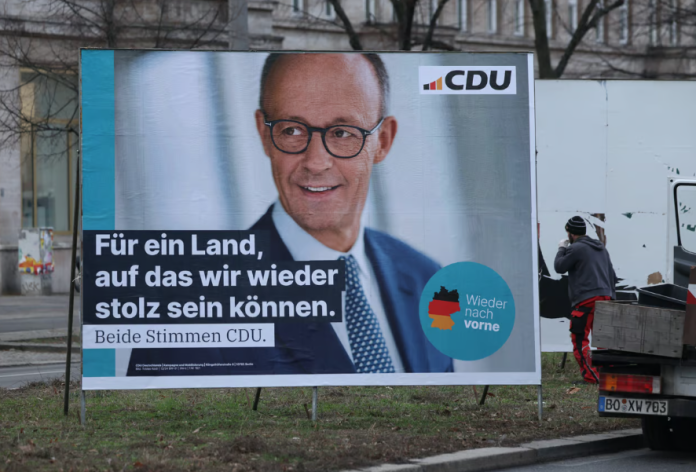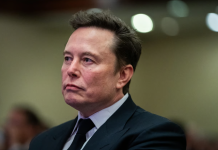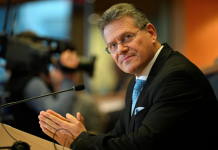BERLIN — Germany’s likely next chancellor, Friedrich Merz, has vowed to restore Germany’s industrial competitiveness by putting climate policies on the back burner.
Germany’s economic policies have been “almost exclusively geared toward climate protection” during the reign of Chancellor Olaf Scholz, Merz said during a campaign speech in the western industrial city of Bochum on Monday. “I want to say it clearly as I mean it: We will and we must change that.”
Germany’s left-leaning coalition government, which collapsed in November over persistent rifts on spending and economic reforms, committed to “ideally” phasing out coal by 2030, eight years before the official target date. In order to meet that goal, the coalition — which included Scholz’s Social Democratic Party and the Greens — massively expanded renewable energies and subsidized energy-intensive companies to help them achieve climate neutrality.
Germany, as a result, is the European Union’s industrial leader in producing green infrastructure, having the most facilities for producing solar and wind technology. It has the second-most facilities for making of heat pumps, trailing Italy.
Merz, however, suggested he would radically change course.
“In recent years, we have agreed often enough on which [energy resource] we will phase out,” he said during his speech, mentioning both coal and nuclear energy. “But as long as we don’t have a replacement, decommissioning what we have is out of the question. If we continue to do this, we will massively jeopardize Germany as an industrial location, and we are not prepared to do that.”
Merz and his conservative alliance are polling at 31 percent support, putting them in pole position to lead Germany’s next coalition government after the country’s Feb. 23 election. The far-right Alternative for Germany (AfD) party is polling second with 21 percent support.
The problem for Merz is that, given the AfD’s strength, his conservatives are almost certain to have to govern with the SPD or the Greens, the parties that pushed the policies he’s railing against. Merz has ruled out a coalition with the AfD.
During his Bochum visit, Merz also expressed skepticism of the previous government’s focus on “green steel,” steelworks powered by hydrogen derived from renewable power, saying in a panel discussion that he does not “believe that the rapid switch to hydrogen-powered steelworks will be successful.”
ThyssenKrupp, the erstwhile national steel champion, received about €2 billion in government subsidies in 2023 to speed its transformation away from CO2-emitting production by replacing coal-fired steel furnaces with new ones powered by hydrogen.
In Bochum, Merz suggested he’d bet on carbon capture to mitigate emissions generated from steelworks instead of seeking to avoid them completely with hydrogen.
Merz’s central concern about hydrogen made from renewables is cost. But experts warn that carbon capture, an electricity-hungry technology, also comes with a hefty price tag and is not yet available at the scale needed to decarbonize the steel sector.
Robert Habeck, the chancellor candidate for the Greens, pushed back against Merz’s comments on hydrogen-powered steelworks.
“Nobody should believe that steel produced with coal-fired power and coal energy still has a chance on the world market,” Habeck told reporters on Tuesday.
SPD leaders also criticized Merz.
“Anyone who wants to dial back now will destroy billion-euro investments and tens of thousands of jobs,” Anke Rehlinger, the premier of the southwestern state of Saarland, where the steel industry is a key sector, told German outlet Stern.
Zia Weise, Rasmus Buchsteiner and Chris Lunday contributed reporting.






















